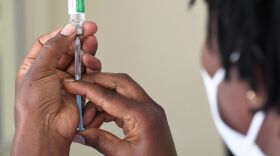
Ashish Valentine
Ashish Valentine joined NPR as its second-ever Reflect America fellow and is now a production assistant at All Things Considered. As well as producing the daily show and sometimes reporting stories himself, his job is to help the network's coverage better represent the perspectives of marginalized communities.
Valentine was born in Mumbai, India, and immigrated to the United States as a child. Before working in public media, he spent two years in northern France teaching high school English. He joined NPR from Chicago member station WBEZ, where he produced two daily news shows and worked on an award-winning joint WBEZ-City Bureau series investigating racialized disparities in home mortgage lending in Chicago.
Valentine speaks fluent French and is a graduate of the University of Illinois at Urbana-Champaign, where he studied English Literature.
-
A new artificial intelligence program has beaten the world's best players in the popular PlayStation racing game Gran Turismo Sport. But the impact could be felt far beyond that.
-
Retired Maj. Gen. Paul Eaton says war-gaming and civics education could help assure that the military is better prepared for a contested election.
-
Catherine Kim's family kiosk is just one business targeted by shoplifters in California in recent weeks in what California Attorney General Rob Banta says is an organized operation.
-
The world has "lost the plot" on equitable vaccine access and is falling far short of targets to vaccinate the global south, according to scathing assessments from experts.
-
Researchers at Microsoft have developed a faster way to write data into DNA — a biological alternative to the bits on a hard drive.
-
NPR's Ari Shapiro chats with Madhu Pai, a global health expert at McGill University, about the state of vaccine deliveries to Africa and the global south.
-
William and Diana Gutierrez lost their lives to COVID approximately two months apart last winter. We take a moment to remember their lives.
-
Law professor Joseph Margulies explains how the now-repealed Georgia statute came about — and how its interpretation could decide the fate of the three men accused of Arbery's murder.
-
Debbie Ngarewa-Packer of the country's Maori Party says the shift from a zero-tolerance pandemic approach to an easing of restrictions will disproportionately impact Indigenous people.
-
New Zealand is moving away from a "zero cases" approach to COVID-19. NPR's Ailsa Chang talks with Maori party co-leader Debbie Ngarewa-Packer about why she opposes the change.







